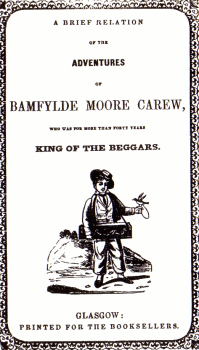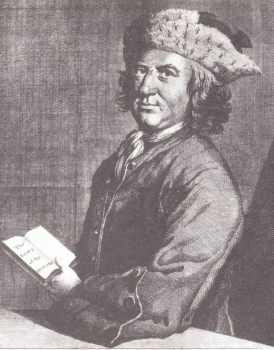As Bampfylde's notoriety spread through the West Country he was to become a source of entertainment and amusement to many; there were those who relished the chance to challenge him to deceive them by his artful disguises. It is even said that a certain Mr Jones of Ashton near Bristol was twice so deceived in the same day, despite having wagered with a friend that he would not fall for such ploys.

It was around this time that the life of old Clause Patch[2], King of the Mendicants, was drawing to a close. Though he was weakening rapidly, Clause found the strength to speak to the assembled gypsies who had travelled to London on news that his end was nigh. At the end of his address he urged that the people should choose the best candidate to replace him without showing favour to one of his eighteen children.
Ten candidates put themselves forward for the ballot to determine the new king, each one a long time member of the gypsy community with full knowledge of its customs. To assist the electors in coming to their decision, the candidates were obliged to post in a public place an account of their most remarkable mendicant exploits ten days before the election date, and on each of those days, to attend in person at the ballot station so that the electors could observe at first hand the countenance of each would-be king.
On election day each voter placed a white ball in the ballot box of their preferred leader, and a black ball in each of the other boxes. When the election was over, the candidate with the most white balls was elected king.
Bampfylde chanced to make a courtesy visit to the house of an acquaintance in Barnstaple. Unknown to him a bitter enemy of all the mendicants, Justice Leithbridge, was lying in wait; he slammed the door as soon as Carew entered, preventing his escape. The justice was seeking retribution for a past misdemeanour: Bampfylde had frightened the justice's horse while standing on a bridge dressed as a lame cripple.
Next day he was taken to Exeter where he was imprisoned for two months prior to an appearance before the justices at the quarter sessions held in Exeter Castle.
On being told by the chairman of the justices that he was to be transported to Merryland, after cheekily correcting the chairman's pronunciation of this American colony, Carew feigned gratitude, saying it would save him five pounds for his passage to a country he had dearly wished to visit. In a more serious vein he asked under what law he was being prosecuted, as he had not been accused of any crime.

The judge ignored his protestations, convicting him of the crime of vagrancy which meant earning a living as an itinerant beggar. Perhaps mindful of the demand for labour in the colonies, he imposed a very harsh penalty by today's standards. The sentence was seven years banishment to the plantations of Maryland.

After an eleven week journey aboard the Julian, Captain Froade weighed anchor in Talbot County up Mile's River, firing a gun to alert the planters of his arrival. He went ashore to obtain a hogshead of rum that would be put to good use during the sale next day of the one hundred or so prisoners onboard [3].
On the day of the sale the prisoners assembled on the deck where a large bowl of rum punch was laid out for the pleasure of the planters who very soon arrived in good numbers. Those men with the skills of a useful trade such as tailors, joiners, blacksmiths or weavers were snapped up first.
Notwithstanding the blandishments of the captain who did his best to promote Carew's worthiness, no sale was achieved. Next day the captain asked Carew to go ashore with him; as they were walking they were engaged in conversation with several planters who expressed an interest in purchasing him.
So it was that Carew escaped from captivity.
Joyous in his freedom, Carew was oblivious to the imminent threat to his new-found liberty: he was unaware of the regulation requiring all travellers to carry an official identification document, nor did he know that a £5 reward was payable to anyone apprehending a runaway.
Early one morning he was stopped by four lumbermen who demanded to be shown his pass and asked where he was heading. Being unable to produce the pass, the lumbermen took him to New Town where he was held in custody pending the arrival of Captain Froade.

Carew was then taken onshore to a blacksmith to have an iron collar of the kind used on runaway slaves fitted round his neck. Severely encumbered in this way, and in much discomfort, he was set to work loading the ship under close scrutiny.
One day while employed in his usual drudgery, Carew was unexpectedly visited by two good friends who were ship's captains hailing from Bideford in North Devon. They dearly wished to relieve him of his burden, and would have taken steps to free him from his plight were it not for the £40 fine and six months imprisonment imposed on anyone caught removing a slave's collar. Instead, the captains advised Bampfylde to make his escape and travel many miles to a place where there lived a tribe of friendly Indians who would do their utmost to remove the burdensome yoke.
Following the directions given to him by his friends, Carew slipped away from his captors later that day, travelling only during the night so as not to be seen; to keep the many wild beasts at bay he whirled lighted sticks above his head. After four days had passed he reached an area so remote that he deemed it safe to walk through the day, eventually making his first contact with some Indians. As he saw five of them coming towards him, he was fearful that they would be from one of the hostile tribes for he had no way of defending himself. As they approached, Bampfylde could see that they were dressed in deer skins, and that their hair was exceedingly long, hanging down over their shoulders; and to his inexpressible joy, they had guns in their hands, which was a sure sign to him that they were the friendly Indians.
The king then took Carew to his wigwam and ordered food and drink to be given to him which he eat heartily. The king spoke excellent English, and told him that his name was George Lillycraft, and that his father was one of those kings who were in England in the reign of Queen Anne.
Bampfylde was treated with great kindness and reverence by these Indians; he was even provided with a sleeping place in the king's wigwam. Nevertheless quite soon he developed a yearning to return to his native country, and while on a hunting expedition with the Indians he stole a canoe and made his way to Newcastle in Pennsylvania. There he wandered about, pretending to be a Quaker; being so well received by this fraternity, he had no difficulty in persuading them to part with their money.
He made his way to Philadelphia in this guise and then on to New London where he enquired if there were any residents going by the name Davey. He was introduced to two elderly sisters of Sir John Davey who was from Creedy Park near Crediton in Devon. They said they were married there and their sons were timber merchants.

They were delighted to meet a man who could inform them about their family, and he raised vain hopes in their mind that "they were near heirs to a fine estate near Crediton." So completely were they taken in by him that each gave him one guinea and a letter to be passed to their relative Humphrey Davey[4]. They also recommended Carew to one Captain Rogers whose ship was about to depart for England, and the captain agreed to take him on this journey.
Fearing that on arrival in England, he and all the able-bodied men onboard would be pressed into service in the King's navy against their will, Carew decided on a cunning ruse to avoid being drafted. He pricked his arms and chest with a needle, then rubbed in bay salt and gunpowder which made it look as if he were suffering from smallpox. Carew's concern turned out to be well founded: on arrival at Lundy a pilot to guide the ship on to Bristol came aboard, and he had bad tidings for the men.
As soon as they arrived at King Road outside Bristol the following morning, a boat made its way towards them from The Ruby. It moored alongside and the lieutenant came on board. He harangued the assembled crew and beseeched them to volunteer for service, and with some reluctance a majority of the men agreed to do this.
At this moment, Carew employed an artful double-bluff, saying that it was years ago that he had the smallpox, and he was no longer suffering from it, so would the lieutenant please take him also. Naturally, the lieutenant was having none of this, saying he would not take Carew if offered five hundred pounds. He did however agree to take him ashore, and so it was that after having seen many cities and men, undergoing great hardships, and encountering many dangers, Carew once more set foot on English soil. He made his way to the city of Bristol, not yet ready to abandon his pretence of suffering from smallpox, but on arriving there he felt confident that the threat of being pressed had now passed.
Bampfylde enquired as to the wellbeing and whereabouts of his wife Polly. The landlady said she had not seen her lately, but had heard that she and her daughter were both well; Polly had said she had not expected to see him ever again.
With Carew a free man and back in the West Country that he knew and loved, we come to the end of the account of the adventures of his middle years. The last part of this sequence concerning his final years is to follow.